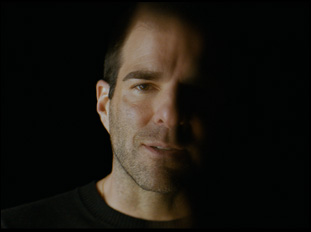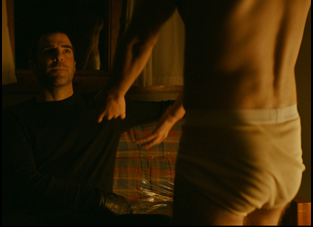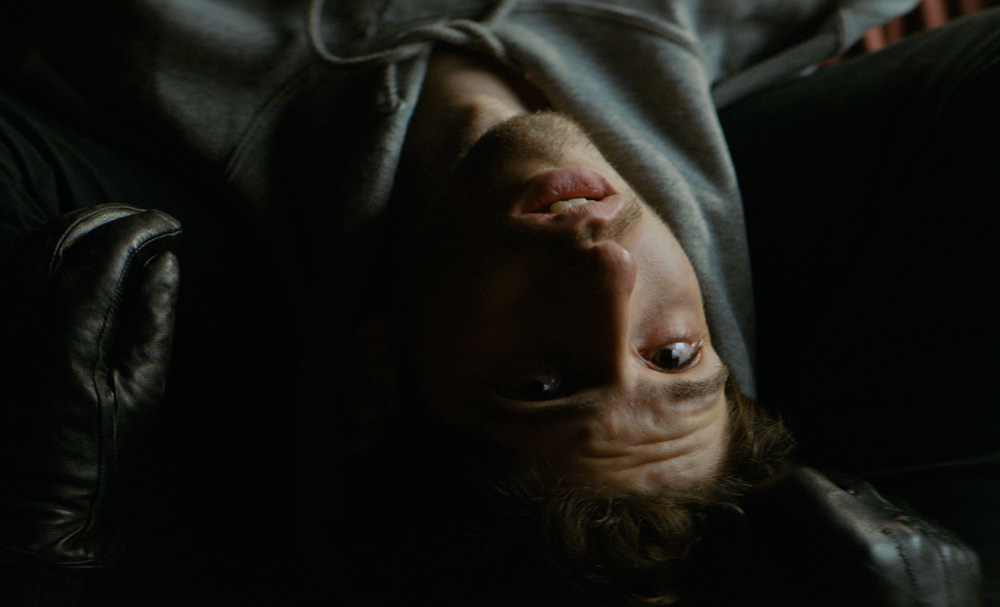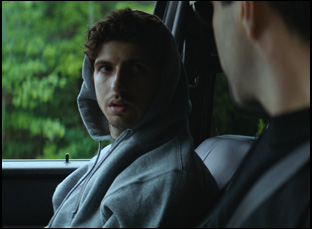When Sam Max was first storyboarding what they were thinking their debut short “Chaperone” would look like with the cinematographer Jordan Parrott, the DP noted how Max was placing the actors with a sense of depth.
“I didn’t realize that about myself, but depth [was] something that coming from a theater background, I’m used to working in three dimensions and thinking about the diagonals in a space,” Max said, on the eve of the film’s debut at Sundance.
How the anonymous men at the heart of “Chaperone” related to one another was always going to be important when doing a delicate dance around a most sensitive subject and Max’s canny blocking is indicative of the care he takes in a profound sense of spiritual loss in the drama as a driver (Zachary Quinto) is asked to escort a young client (Russell Kahn) for vague but obviously unsettling reasons, their trip from the city to the countryside shorter than the distance between on the ride over. It’s imperceptible when Quinto’s chaperone cracks a joke, so stoic as he carries out his job and the passenger can be barely bothered to speak, feeling the weight of the world on his shoulders. Still, the two need only look over at each other to know they are not alone, giving a small degree of comfort to a desperate situation and Max, inspired in the midst of the pandemic, provocatively explores the unusual forms that caring for another can take and how pain can be intertwined with acting in good conscience with the mix making us human.
With the film available to watch anywhere virtually in the U.S. as part of the online Sundance Film Festival, Max shared the inspiration behind “Chaperone,” how the combination of Kahn and Quinto helped reshape the relationship at its center and finding the perfect location to film.
I felt inspired by the times that we’re living in right now, and in writing the script, I really wanted to capture the feelings of isolation and disconnection and sorrow that I was feeling, and still feel, for the majority of the pandemic. And I was interested in envisioning a character, Zachary’s character, who is surrounded by death, but trying to imagine him in a profession that’s slightly elevated and a little more fictional, just because those are the worlds that I feel interested in and then the relationship between these two came about through the writing process.
After you knew Russell Kahn and Zachary Quinto would be in the roles, did anything change in the dynamic based on what you were seeing between them?
Yeah, I was pretty nervous to be honest in the early stages because I love them both as performers separately, and I never saw them read together. And I come from a theater background, and how I cast a lot of my performance projects was really on impulse. In my own projects, I rarely held formal auditions for roles, and haven’t really had to up until this point, so I was really acting on intuition and my impulses were telling me that they would be a really interesting combination because as people, they just have very different temperaments, and they’re also in very different places of their careers professionally, so I thought that that contrast between them would lead to a really interesting relationship on screen. Luckily, my impulses were right about that and it was a pretty short rehearsal process and I think they both understood the world of it. And as a director, I had to work in very different with both of them, which was really exciting to me as well.
It was surprising to learn that Russell was actually the one to champion the project at first, not necessarily as an actor, but in his day job at CAA. Did you immediately see him playing this part?
It actually wasn’t totally obvious to me at first. Russell and I have known each other for several years and have been wanting to find projects together. And I knew Russell more so as a producer first before I knew him as an actor. I saw him in a couple projects in the city, and it was really apparent that he had a really incredible toolbox as an actor and as a performer that, early on, I thought this is someone who would be really interesting to work with and has a lot of depth and range. And as I was thinking about my first film projects, I was sending them to him because he’s a mind that I really, really trust. Through the development process, it became clear to me that he was the only choice for this role and it’s meaningful to me personally, on a relationship level, to have him star in the film.

That set-up for the film, starting in an urban environment and then moving to a place that felt remote, was really central to my conception of the script from the very beginning. A major part of what I was observing during the pandemic, and before that as well, was when crisis happens, [there’s] this desire to retreat or to return to nature in some way. I was watching a lot of my friends and family and community feeling really upended by everything that was happening, so that move from an urban center to a more remote environment is definitely an expression of just what I was observing and as we’re putting together a budget and seeing how much the film costs, there are conversations about cutting environments, and do we really need to see them drive out? And the logistics of shooting while driving can be a logistical nightmare. Thankfully, I have really good producers who helped me through that. But I knew it was something I never wanted to compromise on.
I really appreciated the ambiguity throughout this regarding the central situation. Was that foundational or something you may have pared back in the edit, figuring out what you needed?
It was that component of the script was really fundamental in the writing. Since the very first drafts, I was playing with that ambiguity and that anonymity, finding that I felt really aesthetically inspired and excited by leaving a lot of aspects of the narrative to the audience’s imagination. It felt really crackling to me. I love watching cinema that keeps an audience engaged by not handing everything to them and I really love just this process of feeling like I’m being actively engaged with and worked with while I’m watching something, so that’s where that came from.
Was there any direction this took that may have been unexpected once you got to set?
Yeah, as a writer, I’m interested in continuing to evolve the script over pre-production and production because I have a really firm idea of what I want, but I also think that a writer and a director have to be very responsive to what’s happening in real time, so regarding the ending of the film, the one that’s shown in the final cut is one that was not written, but we arrived at through the process of shooting. Through the editing process, I think there were three or four different endings that have existed for this film and it’s a very tonally specific film, as you can see, but the ending was very, very difficult to find. Luckily, we had the right footage to construct our own ending for the final film.
How did you find the house in the country?
It’s a funny story. The production for this film looked like a lot of remote collaboration from our laptops, and all of pre-production was done remotely. I was meeting with my production designer and my costume designer on Zoom, and the location hunting process was also conducted electronically, so what we did was we were like, “What is the most accessible way to location scout right now?” And we were on Airbnb for weeks, going on there and choosing the places that we liked and corresponding with hosts. Of course, there were a ton of hosts that were like, “Absolutely not, you can’t film a movie in our house.” But we found this amazing farmhouse that’s on many acres of land in New Jersey that felt like this one site could have all of the different location of the film, aside from the road scenes. The owner was just so excited we were there, and I think he’s hosted other film teams before, so he was used to the process and the fact that we would be taking down a lot of decorations in his house. We left it in a good condition, but luckily we found someone who was accustomed to that process.

Yeah, I love it. It’s becoming a great passion of mine and the film has been really well received by the universe, so I’m excited to keep directing. Coming from theater, it’s a totally different way of working and at the time [of writing this], I was mostly in my room and working from home for a year-and-a-half at that point during the pandemic, and was just totally not used to the idea of working an overnight, and what it means to have the endurance to shoot so much footage over the course of so few days. That way of working was just something that I hadn’t experienced in a long time and in theater, we are working on a long piece over the course of weeks and weeks and I get to see a scene dozens, if not hundreds, of times before it goes to production, so film was really interesting in applying my director skillset to the quickness with which we have to move on from scene to scene, and really strengthening my muscle of knowing when a scene is done shooting and when I can move on from it.
What was it like to get the call you were going to Sundance?
That was the total dream moment. I don’t even know if I have the words to express how I felt. It was certainly not something I expected and I very much understand this film as my first filmmaking endeavor, so getting the call that your first film is going to Sundance is just totally insane. And I was extremely grateful, I feel really lucky to have been selected by programmers who I think really got the film, and were really captivated and moved by it, so I just feel really lucky that all of the circumstances led to the right thing at the right time.
“Chaperone” will be available to watch virtually through the Sundance Film Festival from January 20th through 30th.





